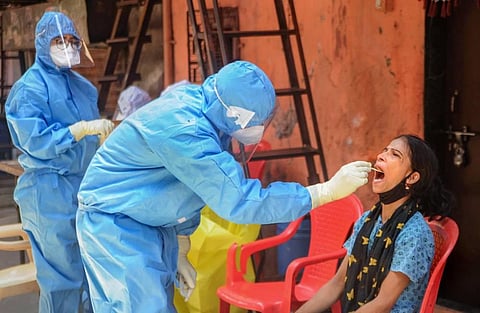Centre to conduct serosurvey in 10 hotspot cities to track community transmission of coronavirus
NEW DELHI: In what could be India’s first exercise to determine the true prevalence of COVID 19 in worst-affected areas, the government is launching a serosurvey in 10 hotspot cities to estimate the extent of community transmission of the infection.
As gathered by The New Indian Express, the survey which will use the antibody testing kits developed by the National Institute of Virology and will begin this week, is in addition to surveillance exercise that will test nearly 24,000 blood serum samples from 69 districts across 21 states.
The latest planned survey by the Indian Council of Medical Research (ICMR) will test 500 samples for the presence of antibodies against SARS CoV 2 in 10 cities.
Sources said that in the project, 50 serum samples will be collected from 10 randomly picked containment areas in every city. This will amount to the overall testing of 5,000 samples in these cities.
The cities that will be a part of the survey include Mumbai, Ahmedabad, Pune, Delhi, Kolkata, Indore, Thane, Jaipur, Chennai, and Surat. Nearly 70% of India’s total caseload was contributed by these cities as of now.
“In this survey we are specifically targeting areas that are badly hit and are seeing extensive outbreaks of the infection,” an ICMR official told TNIE.
“The results of the survey will tell us what percentage of the population has been exposed to the virus yet.”
Some epidemiologists pointed out that serosurvey studies are central to the efforts in deciding the strategy and planning implementation of COVID-19 response.
“I congratulate the government for making the sero surveillance as the basis for understanding the COVID-19 pandemic,” said Dr Giridhara R Babu, professor and head of Lifecourse Epidemiology at the Public Health Foundation of India.
These surveys will provide information to track changes over time, and tailor improved responses, he said, adding that the results regarding true prevalence can help reduce mortality by setting priority actions.
Though the Centre has been maintaining that there is no community transmission of the disease yet—local authorities and epidemiologists—have been saying that the epidemic has reached this stage at least in the worst-affected areas.
Meanwhile, sources said that samples for the serosurvey planned for 69 districts—with cases per million categorized as high, medium, low and zero, --have been collected from all districts except 8 districts in West Bengal and Jammu and Kashmir.
“We are hoping to collect the remaining samples from the rest of the districts in a few days and the final report should be ready by the first week of June,” said a government official.
Apart from these two surveys, the government has also planned a health facility-based surveillance in all 733 districts in which 400 samples from healthcare workers and outdoor patients from randomly picked government and private hospitals will be tested using both diagnostic RTPCR and antibody tests.
“The protocol for this surveillance project is still being finalised,” the official added.
What is a serosurvey?
A sero-survey involves testing of blood samples in a population for a specific reason.
In this case, it will involve testing serum separated from the blood for the presence of antibodies against SARS Cov 2, the pathogen that causes Covid 19. The presence of antibodies in someone's blood serum will mean that the person has been exposed to the virus and has recovered.

